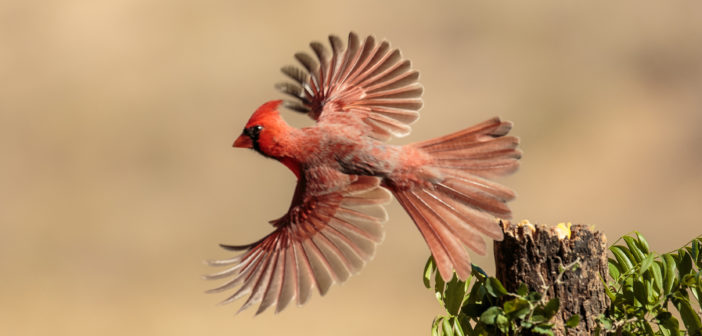Is your yard a flight path, but never a landing strip? That happens when a yard holds little or nothing to encourage birds to fly in and stay. You see, birds have limited time—their days are busy with the need to find sufficient food, adequate shelter, and suitable nesting places. If your yard doesn’t offer any of that, they’ll fly on by. There’s good news, though: here’s how to turn that around and attract birds in fairly quick order. Birds will notice the “amenities” you’re offering and lower their landing gears!
First, feeders
Hang bird feeders. Attract your favorite birds by filling them with seeds, nuts, and fruits they prefer, such as white millet for sparrows, safflower for cardinals, peanuts for jays and woodpeckers, nectar for hummingbirds, and grape jelly and orange slices for orioles. The broader the selection, the more species you’ll attract. If you want to offer only one kind, then black-oil sunflower seeds, in the shell or chipped, are the way to go, as they have widespread appeal for seed-eating birds. (Place feeders 10 to 12 feet (3.0–3.7 m) away from shrubbery so that birds will be safe from hidden predators.) Birds and their favorite foods
Water, too
Hang birdhouses
When you offer food, water, and shelter, birds will not only visit your yard regularly, but many will nest there, too. But, they’re particular—various species have differing requirements. So hang birdhouses suited to the kinds of birds you want to use them. They must also be placed at proper heights and locations. For instance, American Robins like to nest on a shelf, and House Wrens want a birdhouse with a tiny entrance hole that will keep larger birds out. Bird species and where to hang their birdhouses Buy a birdhouse with these best features in mind
Secure the birdhouse away from direct sun. If placed on a pole, use a baffle below it to prevent predators from climbing up. Select designs that are well ventilated and easy to clean. How to clean feeders and birdhouses
Offer up special nesting materials
Different birds use various kinds of nesting materials, and they also construct their nests in their own particular way. Nests may be made of twigs, leaves, grass clippings, straw, plant stems, pine needles, and other matter in the yard. Some birds use mud or add small stones to their nests. In early spring through early summer, you can add to their choices by offering extra “building” materials. Hang them over trim limbs in visible areas or loosely fill mesh bags with soft materials (make sure the mesh has large holes so their contents can be easily pulled free).
Ideas for nesting materials
- Yarn cut into 2- to 3-inch pieces (5.0–7.6 cm)
- Hair from your dog’s brush, loosely separated
- If you’re a hairstylist, take home hair clippings
- Cotton balls
- Mop string (clean) cut 2 to 3 inches long (5.0–8 cm)
- Broom bristles
- Small pebbles
Plant trees
Trees that produce delicious berries, such as hawthorn, mulberry, serviceberry, crabapple, and cherry will attract numerous birds, including mockingbirds, waxwings, bluebirds, robins, and orioles. If possible, let fallen fruit lay, as birds will feed on it there, as well. Fruit trees also attract insects, which are a vital part of a bird’s diet.
Plant other trees, as well, for additional shelter, nesting, and roosting places. There are varieties to suit any yard size, soil condition, and climate. Include evergreens, such as Eastern Redcedar, conifers, and spruces, for the year-round protection they provide from predators and harsh weather. List of native trees
Plant shrubs
Fruiting shrubs are another source of food for birds. Select varieties that will have fruit ripening at different times, so something is always available. Shrub list
Plant flowering plants
Seed-bearing flowers, such as coneflowers, coreopsis, aster, and sunflowers, are food sources. Plant list
More reading:
Birds and their favorite birdseeds
Attract butterflies to your yard
Native annuals for butterflies
N.A. hummingbirds that migrate thousands of miles
How to attract earthworms to your yard
Build a birdhouse; it’s easy






